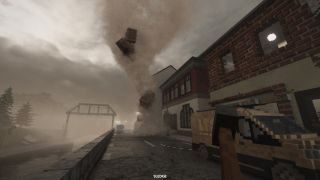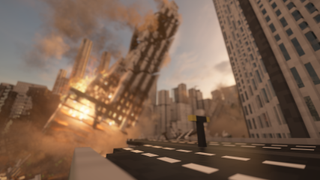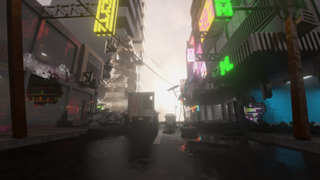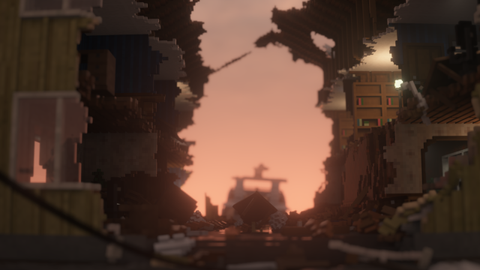Our Verdict
An endlessly delightful destruction sandbox.
PC Gamer's got your back
What is it? A detailed voxel destruction engine framed by heist puzzles and sandbox carnage.
Expect to pay: £18.49/$19.99
Developer: Tuxedo Labs
Publisher: Tuxedo Labs
Reviewed on: Nvidia RTX 2070, 16GB RAM, AMD Ryzen 5 3600
Multiplayer? No
Link: Official site
It would be so, so easy to write off Teardown as just a tech demo. A simple framework of maps, tools and missions built to show off developer Dennis Gustaffson's incredible voxel destruction technology. But over its 18-month stretch in early access, Teardown has proven itself not only a stunning display of technical prowess, but also a bloody good little heist 'em up and the most creative sandbox platform since Garry's Mod.
Teardown is, first and foremost, all about that destruction. It's a game of wooden shacks, concrete walls, metal catwalks and plaster corridors—all of which respond appropriately to being wailed on with a sledgehammer. Despite its blocky appearance, Teardown's worlds break in wonderfully convincing ways. Metal pipes bend and snap when supports are removed, while plaster walls chip away to expose sturdier brickwork, kicking up clouds of dust as they crumble.

I reckon Teardown would be fun enough if all it offered was a set of context-free levels to smash apart. But the game's genius is in how it brings method to this madness—how, from this set of materials and environments, Teardown's campaign tasks you with a series of destructive heists to pull off with a limited set of tools. You have unlimited hammer swings, sure, but that won't get you through brick walls or barred windows—and while you'll slowly unlock an array of blowtorches, shotguns, bombs and rocket launchers, their uses are limited.
Early missions see you using these tools to carve a route through an empty map, speedrunning that course to collect valuables before the alarm timer hits zero. It's a very simple kind of mission, but wonderfully satisfying in how it forces you to consider your carnage. It's not long before Teardown throws in new twists, either—from fire alarms that require you to put out any stray sparks to rocket-toting attack helicopters.
Teardown first launched with half of its campaign, and those early missions can feel a little bit samey. But as it made its way through early access, Gustaffson got more creative with the game's mission design, leading to a game that backloads its more interesting challenges to Act 2. Suddenly you're dealing with car chases, tornados, and killer robots, and the spectacle of Teardown's destruction engine really comes into full force.
Teardown is maybe the only convincing argument I've seen for ray tracing in games.
See, despite being a game of voxels, Teardown is an absolute stunner—and maybe the only convincing argument I've seen for ray tracing in games. Teardown simply doesn't work without light naturally filtering through crumbling walls, filtering through dust clouds, and reflecting off rain-slicked cobbles. When a building comes down it really comes down, collapsing in a burst of volumetric smoke, splintered wood and shattered glass.
Wrecking crew
As a campaign, Teardown is a fun experiment with plenty to prod at, framed by a light-hearted story about a contractor who keeps getting hired by the same feuding businessmen who, honestly, all kinda deserve to have their toys smashed.. Chasing side-gigs and optional objectives gives you more cash to upgrade and unlock new tools, and more excuses to revisit demolition jobs you might have left unfinished.
Each completed mission also sees your mission hub slowly transform from a decrepit warehouse into a lovely family home, your invisible demolitions expert managing to build something new from all this destruction. There's nothing to stop you from driving a truck through the side of your new home, of course, but it's a nice touch.

That said, I'm not sure those heists alone would have kept me coming back month after month. Instead, the real, enduring lifeblood of Teardown can be found in its modding community, which has absolutely exploded since the game's 2020 early access debut. Tired of its nine maps? There are dozens, if not hundreds more on the Steam Workshop, from recreations of Counter-Strike arenas to miniaturised recreations of New York and photo-scanned trainyards.
A sledgehammer is fun enough, but why not go to town on these new wrecking spots with laser rifles, miniguns akimbo, or portable black holes? Portal-style test chambers feature working Portal guns, though you can always bazooka a hole in the side of a puzzle if it's doing your head in. There are mods that take those pesky attack helicopters and turn them into horrifying cyborg dragons that relentlessly hunt you through dingy Russian streets.
It's all too easy to imagine the kinds of new, impromptu games that could spawn from Teardown's foundations.
Modders have even tinkered with the way things fundamentally break. Teardown's destruction doesn't account for structural stability or tension, meaning entire buildings will often be held up by one voxel. Various modders have attempted different ways to remedy that, breaking objects in flight or chaining destruction to create more believable building collapses.
It's reminiscent of the best bits of Garry's Mod, trawling the Steam Workshop every week to see what new nonsense I can plug in. Smashing stuff is a delight, and there's enough new stuff to smash on the workshop to keep me occupied for years to come.
The only real shame is in Teardown's complete lack of multiplayer. While I can appreciate the programming nightmare that must come with trying to sync thousands of exploding voxels across multiple clients, it's all too easy to imagine the kinds of new, impromptu games that could spawn from Teardown's foundations.

Because those foundations really are incredible. Teardown isn't just a tech demo—it's a window into a world where game worlds only became more dynamic, more physical, more breakable. A world that saw Half-Life 2's physics and Red Faction: Guerrilla's destructible architecture and doubled down—instead of pursuing higher graphical fidelity and increasingly static worlds.
Teardown is a game that's excited about its own technology, and wants to show you all the ways it can break stuff. It's a quietly brilliant series of heist puzzles, a never-ending series of new worlds to break and new tools to break them with. But most of all, Teardown really is just a smashing great time.
An endlessly delightful destruction sandbox.

20 years ago, Nat played Jet Set Radio Future for the first time, and she's not stopped thinking about games since. Joining PC Gamer in 2020, she comes from three years of freelance reporting at Rock Paper Shotgun, Waypoint, VG247 and more. Embedded in the European indie scene and a part-time game developer herself, Nat is always looking for a new curiosity to scream about—whether it's the next best indie darling, or simply someone modding a Scotmid into Black Mesa. She also unofficially appears in Apex Legends under the pseudonym Horizon.

Microsoft plans on investing $80,000,000,000 in AI this year, with no sign of the machine learning spending spree stalling just yet

Balatro developer bestows the 'very prestigious Golden Thunk award' on Animal Well, says it's so good it makes him 'feel like an imposter'

I was wrong—Call of Duty: Black Ops 6 players are still finding fault with the Squid Game skins despite them looking cool
